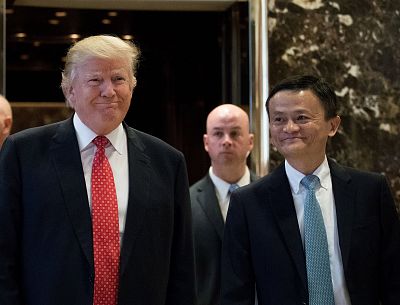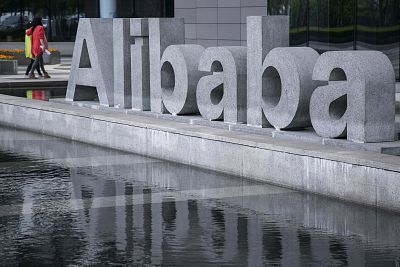The billionaire is seen by many as a feisty comrade-in-arms who grasped success by mastering the Western system — while remaining true to his roots.
BEIJING — For many Americans, Jack Ma seemed just the sort of Chinese capitalist the U.S. could do business with.
 ADVERTISEMENT
ADVERTISEMENT
 ADVERTISEMENT
ADVERTISEMENT
In 2014, the initial public offering of Ma's e-commerce firm Alibaba raised $21 billion. At the time, it was the biggest IPO in American history.
Then in January 2017, Ma met with President-elect Donald Trump in New York and pledged to help create a million American jobs.
In China, though, Ma was seen not so much as a Westernized "modern" businessman but as a feisty comrade-in-arms who grasped success by mastering the Western system — while remaining true to his Chinese roots.
He often described the tricky relationship between business and Chinese authorities by cracking a joke: "Love them. Don't marry them."
But now it's been revealed that "Capitalist Jack" has been a member of the Chinese Communist Party for decades.
His party affiliation, which was confirmed by Chinese state-run media last month, startled many in the West — as did his announcement in September that he would step down as Alibaba's executive chairman next year, and his subsequent denials that the Chinese government had forced him out.
"Outside China, Jack's image may have suffered somewhat," said tech analyst Duncan Clark, the author of "Alibaba: The House That Jack Ma Built." "It's not helpful to him to be seen as 'Red Jack.'"
Inside China, however, the news hardly made a ripple.
“He’d cite George Washington and the cherry tree when talking with Americans, and Mao Zedong when he talked to Chinese.”
Many had assumed he was a party member all along. The revelation might even have sprinkled some stardust-by-proxy on the party's image.
"Even Jack Ma is a party member," Kellee Tsai, dean of humanities and social sciences at the Hong Kong University of Science and Technology told The New York Times. "Doesn't it make you want to join the party, too?"
Throughout the years, Ma, 55, has skillfully "maneuvered between East and West," Clark said. "He'd cite George Washington and the cherry tree when talking with Americans, and Mao Zedong when he talked to Chinese."
Westerners tend to remember Ma for his elfin grin and "goofy charisma," according to Arthur Kroeber, managing director of the independent research firm GaveKal Dragonomics.
But back home, Ma presented himself as the iconic self-made Chinese Everyman, winning street cred for sparring with regulators and openly criticizing the old-school industrial development model that left China's environment "so polluted that we often cannot see the sun."
One of Ma's heroes was the late author Louis Cha, who under the pen name Jin Yong published traditional Chinese narratives of chivalrous Robin Hood-type heroes.
Ma was such a fan that, in a moving eulogy written after Cha died in October, the tech tycoon declared: "Without you, I wonder if there would have been an Alibaba."
The revelation about Ma's party membership puts the spotlight on the Communist Party's still-evolving relationship with China's increasingly influential entrepreneurs.
With 89 million members in a country of about 1.4 billion people, the party remains an elite organization.
Ma joined the party in the 1980s, as the 20-something head of the Hangzhou Normal University's student union.
Back then, becoming a party member seemed like a shortcut to job opportunities and high-powered "connections," especially for an aspiring civil servant such as Ma. (He became a teacher after graduating in 1988 with a BA in English.)
One of the entrepreneur's university classmates posted on the Chinese social media platform Wechat recently that Ma was unique even then. He was "one in a 100" party recruits, helping hundreds of students earn pocket money by helping them find work as temporary train conductors during the yearly Lunar New Year travel rush.
At the time many Chinese perceived Communist Party membership as a comparatively benign way to advance one's career — tantamount to joining a Rotary Club in the West.
The divisive Maoist concept of "class struggle" had been petering out. Mao's successor, Deng Xiaoping, welcomed capitalists to come in from the cold and take part in China's modernization campaign, famously declaring: "It doesn't matter if a cat is black or white, so long as it catches mice."
Politics
During the 1980s, China's embryonic private sector came to life, but remained tiny.
After the 1989 Tiananmen Square crackdown, private businessmen fell under a cloud because some had lent funds, food and fax machines to the student-led pro-democracy movement.
But starting in 2001, then-President Jiang Zemin again dangled an olive branch before China's entrepreneurs, inviting them to become Communist Party members under his trademark initiative, the "Three Represents."
"Jiang reversed the earlier policy and adopted a co-optation strategy toward the private sector," said Kroeber.
However, the pendulum is swinging again today.
Under President Xi Jinping, and especially in the last two years, the party has become "more disciplined, more organized and more intrusive — with both domestic and international agendas," according to Kroeber.
Any organization with more than three party members is expected to function as a "party cell" which holds regular political study sessions. More than 70 percent of nonstate enterprises (and about the same percentage of foreign-run firms in China) have them.
Foreign universities with programs in China haven't been spared; administrators have been instructed that party secretaries should be the senior decision-makers on their local boards of trustees.
Long story short, today's Chinese Communist Party isn't the same animal as it was decades ago.
Nor is China's cohort of internet moguls, who back then seemed like tiny, nimble young things scampering under the feet of China's state-run behemoths.
Beijing's reaction to Canada's recent detention of Meng Wanzhou, the chief financial officer of telecommunications giant Huawei, at the request of U.S. authorities who claim she lied to banks about Iran-linked transactions, shows how intertwined the state and tech sector are.
And if Ma were starting his career today, he'd be hard-pressed to duplicate his own trajectory.
China's business space isn't the wide-open, rough-and-ready frontier it was in his youth.
In an interview a decade and a half ago, Ma revealed a surreal story about how he made his first trip to the U.S. on behalf of a friend who was trying to recover some debts from an American associate. It was 1995, and Ma was making about $10 a month as a teacher and part-time translator in China.
For him, visiting America was a dream come true.
Once he reached Malibu, California, however, Ma's odyssey took a weird detour. His friend's U.S. associate refused to pay the debt Ma had come to collect, and even tried to pressured Ma to stay on in the U.S. as his own business partner.
"Then he started playing with his handgun," recalled Ma, who interpreted the act "as a threat."
World news
After a few days as a virtual hostage, Ma — by now penniless — saw a chance to escape when the American brought him to Las Vegas. There Ma won $600 playing the slots.
At that point he convinced the American to let him travel on his own to Seattle "to drum up some business," Ma said, and he used some of his casino winnings to buy the plane ticket.
Landing in Seattle, Ma sought refuge with another Western friend he'd met in Hangzhou.
"He showed me my first computer," Ma recalled. Friends helped Ma cobble together a primitive website — and by the end of the day he'd receive several e-mails.
That's when Ma decided to use the rest of his Vegas winnings to fly home to China — and to seriously explore "doing this internet thing."
That "internet thing" ended with him being worth around $35 billion.












